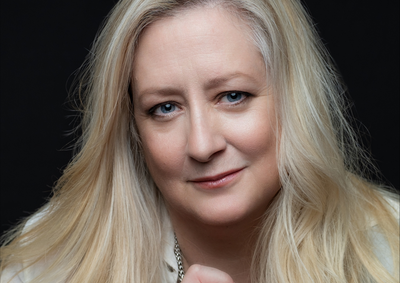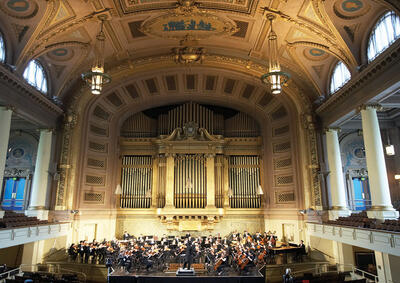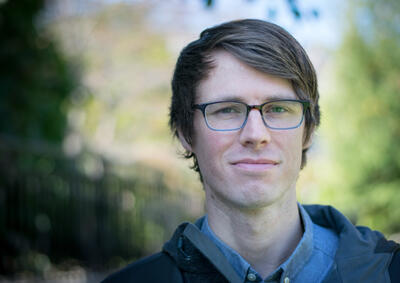Alumna Olivia Malin '07MM, on choosing a career as a music educator
Trumpeter Olivia Malin ’07MM, who studied with Allan Dean and worked in the Music in Schools Initiative during her time at YSM, is entering her 11th year as a public-school music educator and teaches at KAPPA International High School in the Bronx, New York. Malin spoke with us recently about being inspired, as a student, to pursue a career in education despite the pressure she felt to focus on performance.
Q: You were a Teaching Artist in YSM’s Music in Schools Initiative. How did that program prepare you for what you’re doing now at KAPPA International High School?
A: While I was a student at YSM, I was also working in the Music in Schools Initiative. At first I stayed firmly in my comfort zone, teaching elementary/middle school brass group lessons. Midyear, I was branching out to woodwinds and percussion, and in the spring, I was running full band rehearsals when the band director wanted to do isolated lessons himself. I also began working with first- to third-graders learning piano and guitar. My second year in the program, I was placed at a high school where I got the opportunity to teach higher-level lessons and music, and to assist teaching AP music theory. The varied placement over those two years gave me a significant taste of what teaching K-12 would be like, with significant hours teaching piano, guitar, band, and general music classes. Even more important, the program was the first exposure that opened my eyes to what urban schools need, and what they don't need, from me. At KAPPA, I now teach rock band, guitar, IB music, band, beginner band, and chorus – and I have also taught piano and general music – so the majority of classes I helped with at YSM are in fact what I teach full-time now.
Q: Did you know or think, upon enrolling at Yale, that you’d become a music teacher?
A: I have always taught private trumpet lessons, but no, I never thought I would be a full-time music teacher. We all know the stigma that exists about music teaching, and I admit I used to believe that only those performers who weren't very good would end up as educators. It's an easy thing to believe, since once a person becomes a teacher, it's pretty difficult to maintain a high level of performance on their instrument, and most people don't see the “performance level” of teaching. It’s hidden in the classroom – your audience is 30 students who don't always applaud. One of the most difficult barriers I broke through was deciding that public-school teaching would be a higher calling than performing. There is so much outside pressure in the performance world not to become a teacher, and that pressure shows up constantly in little ways from friends, teachers, family, and the general public. [Prof. Dean, Malin said, "is a wonderful teacher who taught me well and supported me through this decision to switch to teaching, something I think not all professors would be able to do."]
Q: What informed your decision to transition from focusing on performance to focusing on education?
A: What I started noticing was that my levels of happiness and self-worth after teaching at Lincoln-Bassett School or Wilbur Cross High School were significantly higher than those after an orchestral rehearsal or concert. I also noticed that I looked forward to being around the students – learning from them and laughing with them as much as teaching them content – much more than I expected. Their energy in the band room was so fresh and vibrant that I wanted more and more hours teaching in the program, and I spent extra time there after my paid time expired. The real moment, however, was when Associate Dean Michael Yaffe approached me sitting in (operations manager) Tara Deming's office one day. He started talking about me to other people in the office, about what great teaching looked like and that he saw amazing potential in me when he saw how I lit up around students. In that short conversation, I saw something in myself that had until that point been a hobby, something I was good at and made a little money at, but which had never been a true option. Hearing him say those things out loud suddenly gave the green light to a career I hadn't realized was a possibility – and a highly respectable possibility validated by the associate dean.
Q: What would you tell incoming YSM students who’re starting to think about what their careers might look like after school?
A: Be open to absolutely anything, say yes to everything, and be professional constantly. The music scene for you can be a combination of so many fulfilling things that it makes no sense to pigeonhole yourself early on. Don't rule anything out simply because of generalizations – they may not apply to you! I am going into my 11th year of public school teaching. I am a proud high-school teacher in the Bronx and a trumpet player in a salsa band in Manhattan – and I wouldn't change anything about my life.






